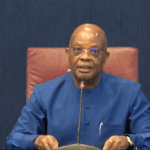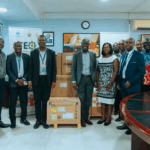
Your Excellency Ibok-Ete Ekwe Ibas, High Commissioner of Nigeria to Ghana
It is with deep respect that I address this letter to you, and I hope you will receive it in the spirit of constructive dialogue for Africa’s shared future. As a proud Ghanaian and a son of Africa, I write in the spirit of continental fraternity and shared destiny.
Africa is rising. At the recent 80th Session of the United Nations General Assembly (UNGA), this was evident in voices united in moral clarity and purpose. Yet Nigeria, one of Africa’s largest nations and most populous states, was absent in person at this defining moment. That absence was more than symbolic; it was a missed opportunity for Nigeria to lead Africa from the front.
Nigeria often refers to itself as the “Giant of Africa.” But in truth, Mr High Commissioner, that giant seems to be sleeping, and the eagle’s wings remain folded when Africa needs it to soar.
At the UNGA, the silence of Nigeria was noticeable. While smaller African nations raised their voices, Nigeria, with its weight of history, size, and influence, did not fully seize the moment. Africa needs its largest nation to embody this spirit, not retreat into passivity.
The absence of President Bola Ahmed Tinubu from the General Debate left a void. Vice President Kashim Shettima ably represented Nigeria, but at such a historic moment- when Africa’s moral voice was united-representation by proxy was insufficient. The world expected to hear directly from the President of Africa’s largest state, and that expectation was not met.
Indeed, the walkout of diplomats – particularly African diplomats – at the UNGA on Prime Minister Netanyahu was defining. It showed that power is not only about military might but also about moral force, solidarity, and principled unity. Even weaker states, when united, can influence world affairs. For Nigeria, Mr High Commissioner, this moment underscored both the opportunity and the responsibility to lead such causes, not only in word but in presence.
Furthermore, Nigeria’s role has never been about borders alone. With over 200 million people, abundant resources, and cultural influence, Nigeria can shape Africa’s future. Yet leadership is not declared – it is demonstrated. And on this score, Nigeria has not fully risen to the occasion.
True, Your Excellency, Nigeria faces challenges: contested elections, insecurity, electricity issues, corruption, and threats of secessionism, alongside pressure on its judiciary. But these difficulties do not diminish Nigeria’s responsibility; they heighten it. A stronger, more stable Nigeria is essential not only for Nigerians but for Africa’s place in the world. Honourable High Commissioner, the Giant must rise not despite these challenges, but because of them.
Nigeria is the Super Eagle of Africa – endowed with strength, vision, and wings broad enough to soar above challenges. Yet today, that eagle rests upon the branch when the sky demands its flight.
In fact, the deeper issue is structural. For too long, Africa’s membership in the United Nations has been taken for granted; too often, our presence has lent legitimacy without securing influence. As President William Ruto of Kenya rightly declared, “You cannot be the United Nations while you dismiss the voice of 54 nations.” His words captured the urgency of Africa’s demand for reform.
Your Excellency, this is a call for Africa’s leading nations – Nigeria, Ghana, South Africa, Egypt, Kenya, and Ethiopia – to act with unity, coherence, and a common policy in international relations. From Ghana, we watch with hope and expectation, knowing that Nigeria’s leadership can ignite the unity Africa needs. Only through such solidarity can Africa redesign the architecture of the United Nations, secure permanent representation and veto power at the Security Council, and press for equity in the World Bank and IMF.
Africa’s moral voice is strongest when its leaders stand united. Ghana in West Africa, Kenya in East Africa, South Africa in the south, Ethiopia in the Horn, and Egypt in North Africa have shown courage in global debates. Yet the continent equally needs Nigeria – not in rivalry, but in partnership. Nigeria’s size, influence, and historic leadership give it a unique role. Together, Nigeria and its African partners can anchor the continent’s authority and strengthen its influence in the world.
As Ghana’s President, His Excellency John Dramani Mahama, reminded the UNGA in his address, “the future is African.” At the 80th Session, he went further: “Maybe you’re unaware of the resilience of African nations or their remarkable ability to make a strong comeback, just when you think it’s safe to discount them.” These words echo the very spirit Africa needs — a spirit of renewal, resilience, and resolve.
Permit me to assert, Your Excellency, that to be a population greater than the rest of West Africa combined comes with super-added responsibilities. Nigeria must rise – not only to lead outright, but to be an integral part of Africa’s rebirth. At the next UNGA, and in every global forum of consequence, Nigeria’s voice should not only be heard, it should be seen to be heard as unshakable.
As a Ghanaian who believes deeply in Africa’s promise, I speak not only as a citizen of Ghana, but as one committed to the rise of our continent. Nigeria has not only the power to shape her destiny, but to contribute decisively to Africa’s future. Yet this will require more than words; it will demand reflection and a renewal of leadership. For when Nigeria reimagines her role with clarity, courage, and conviction, Africa will not only be heard at the world’s great table – it will be respected. This is Nigeria’s moment, and Africa’s cause.
Respectfully



